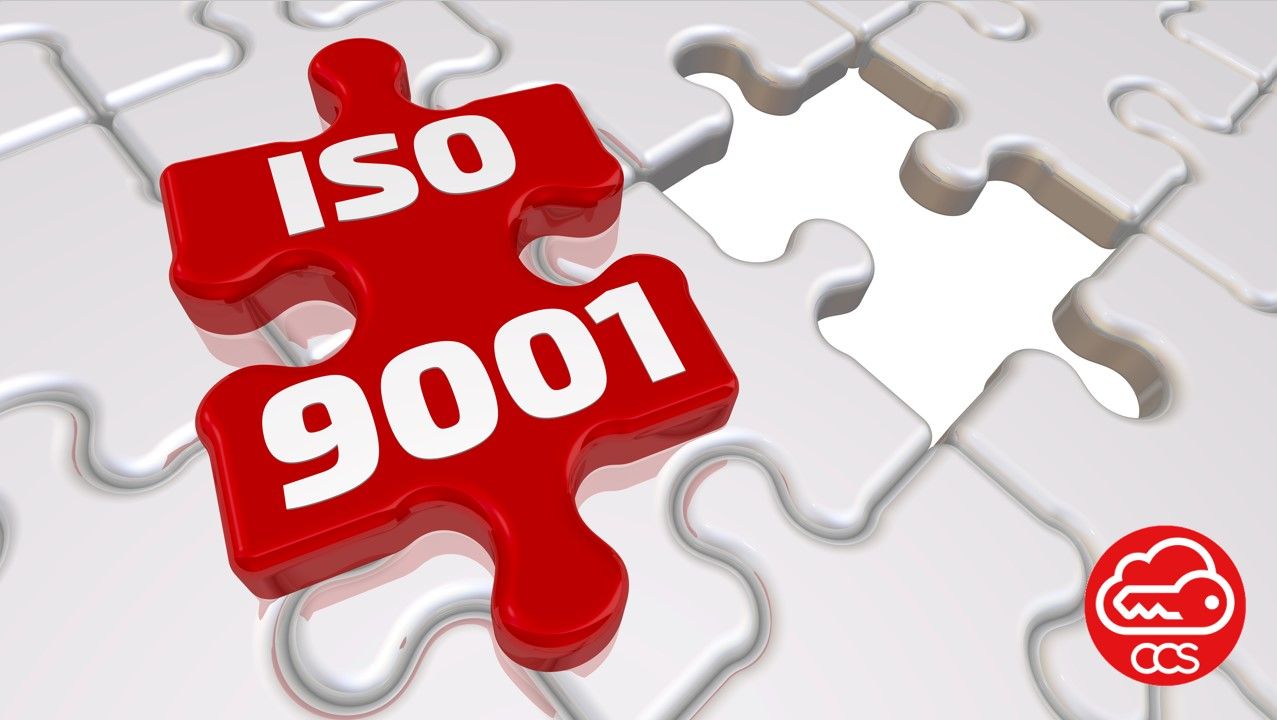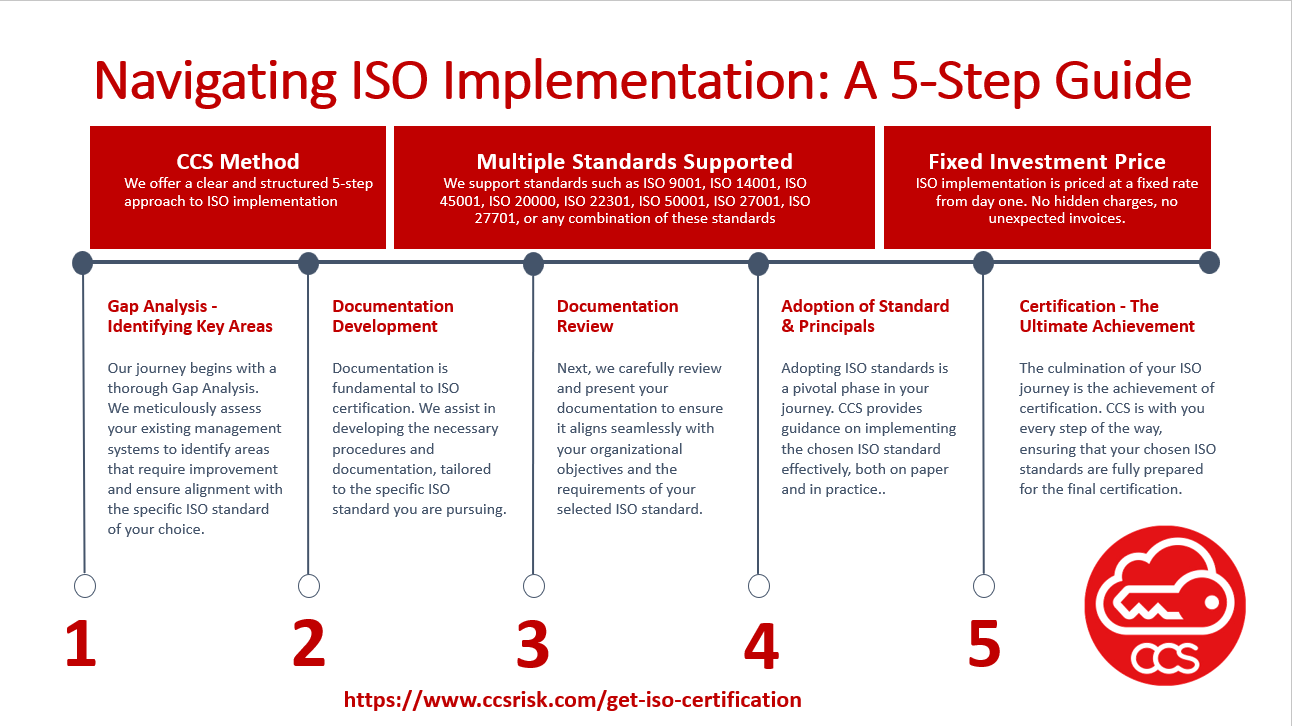ISO 9001: Choosing Between DIY and Professional Guidance
Achieving ISO 9001 certification is a strategic move for organisations to demonstrate their commitment to quality management. There are two primary approaches to achieving ISO 9001: implementing it in-house with pre-written processes, procedures, and FAQs, or engaging an ISO consultancy company like CCS, which offers specialist expertise and a structured implementation process. Each approach has its benefits and drawbacks, which we’ll explore in this article.
Implementing ISO 9001 Using FAQs and Pre-Written Processes
Pros:
- Cost-Effective:
- Utilising readily available ISO 9001 templates, FAQs, and pre-written procedures can significantly reduce the upfront costs. Since there’s no need to pay for consultancy fees, organisations may save a considerable amount of money.
- Faster Implementation:
- Pre-written templates can expedite the implementation process, providing immediate access to necessary documents and procedures. If time is critical, an organisation may find this approach quicker than waiting for a consultant to develop bespoke documentation.
- Control Over Process:
- Implementing ISO 9001 independently gives organisations full control. They can tailor the processes and procedures to their specific needs without external influence, which can be empowering for companies with experienced internal teams.
- Self-Reliance:
- This approach fosters a deep understanding of ISO requirements within the organisation. Teams must engage with ISO 9001’s intricacies, building their in-house expertise, which may prove useful for future audits or updates.
Cons:
- Limited Expertise:
- Pre-written processes and FAQs provide general guidance but lack the nuance and customisation that a consultancy offers. Every organisation has unique needs, and a one-size-fits-all approach may not address specific industry challenges or regulatory nuances.
- Risk of Misalignment:
- Without professional guidance, organisations may misinterpret ISO 9001 requirements, leading to gaps or non-conformities during the certification audit. This could delay certification or result in additional costs to correct these issues.
- Resource-Intensive:
- Even though templates are available, implementation still requires significant time and effort from internal teams. They need to adapt and modify processes to fit their specific operations, which can become overwhelming without expert support.
- Long-Term Maintenance:
- While the initial implementation may be straightforward, maintaining compliance with ISO 9001 standards over time can be challenging. Internal teams may struggle to keep up with updates, continuous improvement, and the documentation needed for audits without structured guidance.
Engaging an ISO Consultancy Company
When working with a consultancy like CCS, organisations benefit from a comprehensive and structured process, typically following a five-step approach. Let’s examine the pros and cons of this option.
Pros:
- Expert Guidance (Step 1: Gap Analysis):
- CCS provides a thorough Gap Analysis, where certified consultants assess your existing management system. This expert evaluation identifies key areas needing improvement and ensures your organisation is fully prepared for ISO certification. With tailored guidance, the risk of oversight or misalignment is minimised.
- Bespoke Documentation (Step 2: Documentation Development):
- Unlike pre-written templates, an ISO consultancy will develop documentation specifically tailored to your organisation’s processes. CCS consultants use platforms like IMSMLoop to store and develop procedures in real time, ensuring they are relevant to your operations and fully compliant with ISO standards.
- Collaborative Process (Step 3: Documentation Review):
- ISO consultants provide ongoing support to review and present documentation, ensuring it aligns with your organisational goals and objectives. With real-time collaboration tools like IMSMLoop, the consultancy ensures a cohesive narrative for certification, which can be crucial for auditors.
- Structured Adoption (Step 4: Standard Adoption):
- A consultancy offers hands-on support during the adoption phase. CCS consultants, for instance, use project management tools to track your progress, automate reminders, and escalate tasks, ensuring that every step towards ISO compliance is completed efficiently. This structured approach minimises the risk of missing critical compliance steps.
- Audit Preparation and Certification Support (Step 5: Certification):
- The final stage of ISO implementation involves preparing for certification. With a consultancy like CCS, organisations have access to a detailed progress tracking system that ensures they are fully ready for the audit. Consultancy services often extend to providing independent certification support or partnering with accredited bodies like UKAS.
- Reduced Risk and Time Commitment:
- Engaging professionals reduces the risk of errors or delays in achieving certification. With expert knowledge and experience, consultants ensure the certification process is as smooth and efficient as possible, saving internal teams from the time-consuming effort of learning ISO intricacies on their own.
Cons:
- Higher Cost:
- Hiring a consultancy is more expensive than implementing ISO 9001 with pre-written processes. The cost of expert guidance, tailored solutions, and ongoing support adds up, particularly for smaller organisations with limited budgets.
- Less In-House Control:
- Some organisations prefer to maintain full control over their processes and procedures. Working with a consultancy introduces external oversight, which might not suit organisations that prefer an independent or DIY approach.
- Consultant Dependency:
- Organisations that rely too heavily on consultants might struggle to maintain the ISO system independently after certification. Without ongoing consultant support, maintaining and updating ISO standards might become challenging, especially as business processes evolve.
Which Approach is Better?
The decision between using pre-written processes and FAQs versus engaging an ISO consultancy depends largely on the organisation’s needs, resources, and experience with ISO standards.
- Use Pre-Written Processes if you have a competent internal team with sufficient knowledge of ISO standards, a limited budget, and the capacity to adapt processes independently. This approach works best for smaller organisations or those with less complex operations.
- Hire a Consultancy if you seek a smooth, risk-free, and structured approach to achieving ISO certification. Companies like CCS provide expert guidance at every step, from gap analysis to certification, reducing the chance of errors and delays. This is particularly beneficial for organisations where achieving ISO standards is critical to operations.
Ultimately, the choice should align with your organisation’s long-term goals, available resources, and the importance of ISO certification in your business strategy.





